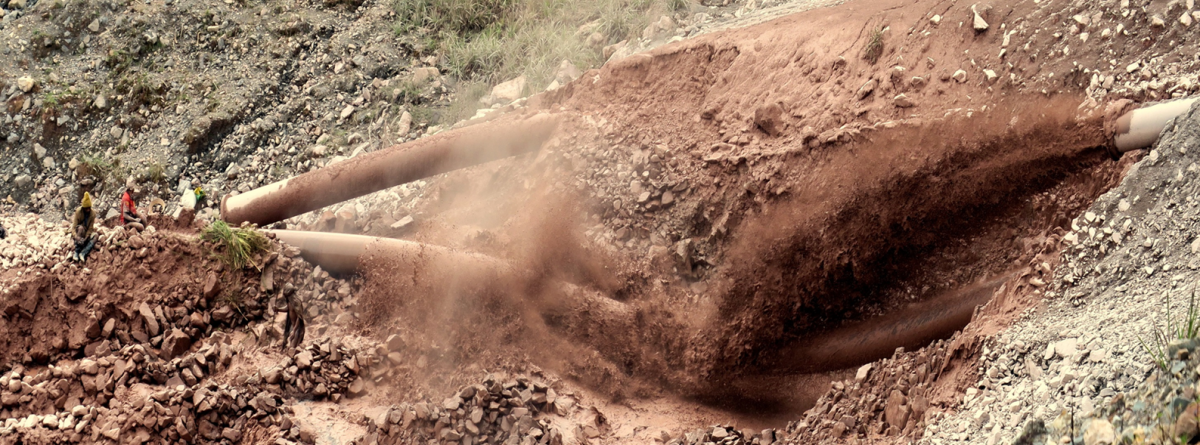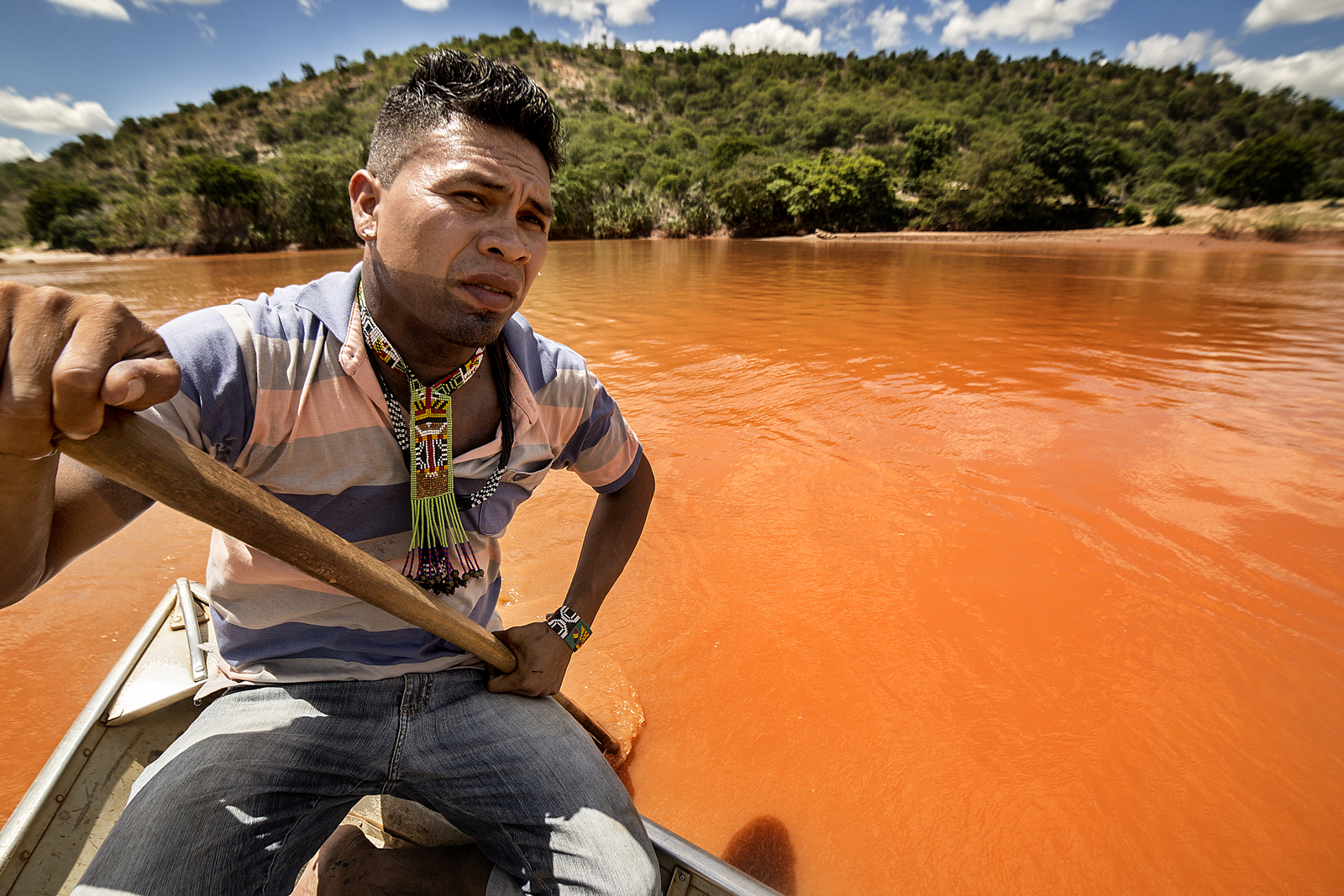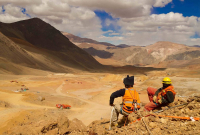Support strong Canadian climate journalism for 2025
The concerns of local residents ranging from Papua New Guinea to Tanzania to Dominican Republic near sites where Canadian gold miner Barrick Gold Corp operates were channeled into a single question at the company's annual general meeting in Toronto on Tuesday.
Some things were different this year; the gathering was helmed by a new president and chief executive, Mark Bristow, and was in a smaller venue (the Tim Hortons theatre at the Canadian Hockey Hall of Fame on Front St just off Bay) than in previous years under founder Peter Munk, who died in March last year.
But one thing was familiar, to both Bristow and Catherine Coumans, the research coordinator and Asia Pacific lead for Mining Watch Canada: As in previous years, Coumans complained about how Barrick operates and the company sought to defend itself and move on.
The official business of the meeting was over within six minutes, and it was then time for questions, at which point a company representative held a microphone out for Coumans to ask the first and only question.
"You can do what you like, Catherine," Bristow said when she asked whether she should sit or stand. They were clearly familiar; Bristow had been Randgold Resources' long-time CEO before Barrick bought it in an all-stock deal valuing the Africa-focused miner at $6.5 billion in September last year, Coumans is one of a five-person team aiming to keep Canadian mining companies accountable abroad. She decided to stand.
"It is shameful that year after year since 2008 either I or people affected by your mines from all over the world, have had to stand here to testify to ongoing environmental and human rights abuses at your mines," she began, reading from a prepared statement.
She cited several allegations from independent investigations — from retired Supreme Court Justice Ian Binnie and other members of the Independent Commission of Jurists (regarding Tanzania) and Columbia University's Earth Institute (regarding the Porgera mine Papua New Guinea) — about excessively violent security guards and unsafe tailings discharge and other alleged abuses at Barrick sites around the world, and asked the new CEO when Barrick would "finally provide local communities with clean drinking water?"
She got in a supplemental as well; will you work with locals in Papua New Guinea to create an equitable remedy mechanism for a litany of complaints as called for by sustainability consultants from BSR that Barrick itself hired to fix its problems?
Coumans first heard of problems at Porgera in 2005, a year before Barrick bought it, and started attending the company's AGM in 2006. The company dismissed reports the security forces were killing men and raping women as lies, until Human Rights Watch published a report in 2011 that documented five alleged incidents of gang rape by mine security personnel in 2009 and 2010, and a sixth in 2008.
"We believe these incidents represent a broader pattern of abuse by some PJV (Porgera joint venture) security personnel," HRW said at the time.

"Thank you for that, Catherine," Bristow said when Coumans was finished. "We all know that this is like an echo. You come every year and you make the same statements. And we deal with it, and the more we deal with it the more you make, repeat the statements."
He acknowledged that she had visited Porgera and said he would "try to explain to you in three different boxes" his responses to her various complaints.
Tanzania better than it used to be, Bristow says
Firstly to Africa, the continent where South African Bristow had long roamed as chief of Randgold, a previously London-listed company, and now must deal with another tricky situation he inherits there as Barrick's chief.
The North Mara mine in Tanzania is owned and operated by Acacia Mining, in which Barrick holds a 63.9 per cent stake.
Coumans said alleged victims of rape, house-burnings, chemical spills, shooting and assaults at the hands of guards either employed directly by Acacia or on police or military pay but housed and fed by the mining giant have little recourse to justice. (Mining Watch Canada issued a report in September 2018 based on video interviews accessible here (PDF))
"Sure, there are issues that you refer to," he said, adding that the overall situation in Tanzania was better now than it was at the end of last century. "There are specific issues, and we've dealt with them in the past, and we will always continue to deal with those allegations."
"The numbers and the specifics that you refer to, those are allegations, they have never been proven to be factual," he said.
Barrick is meanwhile seeking to play the mediator solving "a difficult problem" between Acacia and the Tanzanian government, which accuses it of tax evasion, environmental breaches, money laundering and corruption.
Bristow stressed that Acacia was independent of Barrick and the majority shareholder did not have unfettered access to its mines. He said he aims to create value for all stakeholders, not just shareholders, but also "the communities in which we operate, the people in the countries we operate and also the government, in the form of the treasury of that government."
"Now where I come from in Africa I've done that for my whole career," he said. "And today we've been able to change people's lives."
He said the enlarged Barrick including Randgold and excluding Acacia employs 17,000 people across Africa, providing them with skills and the ability to participate in economic activity.
Bristow “has been working overtime to deal with disputes with the Tanzanian government over a ban of exports of concentrate" and the related allegations, Coumans said in an emailed statement following the meeting, "but has yet to speak out meaningfully about the appalling human rights abuses suffered by many impoverished villagers living in the shadow of the gold mine.”
Bristow, a trained geologist with a straight-talking, hands-on style who had run Randgold since its inception in 1995, acknowledged that the situation in Tanzania was not ideal but did not address them in detail.
The Independent Commission of Jurists said after a visit to North Mara and Tarime, the town closest to the mining sites, that its delegation was "deeply concerned about the gravity of many of the allegations and the difficulties experiences in accessing adequate remedy and reparations."
The mine is by far the largest investment and economic engine for the region, the ICJ report said, and a major attraction for people migrating into the immediate area, whose population has grown exponentially since the mine was initiated in 1998.
"The prospect of gold predictably created a strong economic magnet that was bound to attract people in search of economic opportunities." it said. "As company officials themselves acknowledged, the company was slow in putting in place the necessary physical security and measures to avoid human rights abuses and to redress those which occurred."
"The delegation was struck by the richness of the mine and the poverty of the surrounding area," the report says. "The mine pays taxes and royalties to the national government and service charges to the local government, but investment in basic infrastructure in the region shows that these payments are insufficient or that the local communities do not adequately benefit from them."
Porgera, a 'very, very complicated situation'
Meanwhile at the Porgera open pit and underground gold and silver mine high in Papua New Guinea's rainforest, which Barrick split into a joint venture with Zijin Mining Group Co. Ltd in 2015, complaints from locals have been piling up.
Coumans said the BSR consultants Barrick hired to identify fixes to problems at Porgera released a report (PDF) in September with timelines for action by the company. "No progress has been made to date as proposed deadlines have come and gone," she said.
"What you failed to point out was we are the ones that engaged BSR," he said. Coumans had in fact made reference to Barrick having hired BSR.
"We have taken in their research and we are currently working, I am personally involved in that, and we will deal with the issues that have been raised," he said, providing a specific assurance that the grievance procedure was being improved.
Coumans later told National Observer that an elderly couple had since been badly injured when they were swept away by a sudden increase in discharge of mine tailings from a pipe as they were panning the discharge for scraps of gold at Porgera.
The man and a woman were swept onto sharp rocks and are now in failing health, she said.



Bristow said Barrick had dealt with 350 grievances at Porgera in the last quarter alone and that "we have no intention to reject anybody's concerns."
"Sure, there are always challenges," Bristow said, before citing actions he had taken since becoming CEO including the promotion of sustainability chief Grant Beringer to full Barrick executive (he had been contracted by Randgold since 2014, according to this management summary) and the revision of human rights and other policies.
He said Barrick has delivered electricity to the roughly 60,000 people who had come to the immediate vicinity of its Porgera mine and also distributes clean drinking water in the region via more than 1114 water tanks holding 550,000 litres.
"To say that the tailings disposal situation is poisoning the drinking water is not a factual statement," he said, to which she interrupts to say that was not what the Columbia University report said. (He later cited Barrick's public response to that report, which can be found here (PDF))
"The solids that are being deposited in the rivers...we have a plan to manage those solids. We don't have any deleterious chemicals going into the rivers," Bristow added.
"It's easy to criticize and it's not very easy to make a difference," he said to Coumans at one point. "And when I understand you, what you are trying to suggest is that we should leave."
Coumans did not at any point in her comment and question suggest that Barrick should leave any of its operations.
Meanwhile, minutes earlier outside in the food court-cum-corporate thoroughfare leading to the hockey museum, a small group of protesters raised banners and chanted their opposition to Barrick's operations in Papua New Guinea, Tanzania and Dominican Republic as they were escorted out of the building by security guards.
Dominican dam 'a time bomb', residents say
One of organizers of the flash mob protests also sent National Observer video testimonials and translations from residents near Barrick's Pueblo Viejo double open pit mine in Dominican Republic, which the company wants to expand to increase production by 50 per cent.
In the videos, the residents express concern about the safety of the mine's tailings dam, which they say emits substances that irritate their eyes and throats and cause nausea and which they fear could collapse.
"It is a very serious problem to live under this wall," said Leoncia Ramos in one clip. "Because that is where they dump all the waste of Barrick Gold, all the toxic substances, sulphur, cyanide – all that passes through our communities, causing various diseases, and a number of problems because it destroys the environment."
"For us, it is a time bomb. Why? Because it can collapse at any moment, burying about 600 families who live around here."
Another resident, identified in the video only as Luvito, said he feared a collapse similar to one in Brazil that killed more than 200 people in January.
"We are terrified. We barely sleep because that’s all we can think about, that it could collapse from one moment to the next," he said. "The water is coming out from the bottom [of the dam], all the rotten stuff underneath will collapse one day.
Even without a catastrophic incident, residents says the mine is affecting their health.
"We are threatened by the bad smells that come from there when it is raining," said Sonia Perdomo. "And this... kind of haze that comes up... it really irritates our eyes, makes our throats very sore, gives us headaches, nausea and you feel you get dizzy easily."
On Wednesday, Barrick issued its first quarter financial results. It said profit in January to March was $111 million, or six cents a share, one-third less than what analysts on average had expected. The figure is also down from a profit of $158 million, or 14 cents per share, in the same quarter last year.
Bristow told investors and analysts later that the company had identified $1.5 billion worth of assets it plans to clean up and sell off in the next year.
(Editor's note: Article was updated at 5:45 pm on May 30, 2019 to correct the name of Barrick sustainability chief to Grant Beringer from Rod Beringer, spelling of Porgera mine, and a typographical error in name of theatre where AGM took place.)






Comments